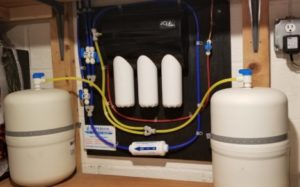
I have recently purchased a reverse osmosis water purification system. In doing so, I did quite a bit of research on the subject of in-home water filtration methods. The question of wastewater with a reverse osmosis system was a concern.
In response, the short answer is no.
In its decidedly unusable state, the water entering your home would be considered waste or polluted to the extent that you would not want to consume it in the first place. It would, therefore, be no more wasteful after filtering occurs.
By and large, reverse osmosis systems do require the use of between 4 and 5 gallons of unfiltered water to supply your home with 1 gallon of clean water. This said the other 3 to 4 gallons used in the process would, indeed, be lost to you but not the world at large. The water would simply end up back into the municipal water supply for future processing or into a septic field where Mother Nature would then recycle it back into the groundwater, subsequently naturally filtering back into wells and aquifers. It should be said that there are some models now that have become much more efficient at up to 75%. This means that for every 3 gallons of water produced, only 1 gallon is wastewater. The argument that most salespersons would employ at this point is that you would lose much more than that while taking a shower; you spend so much water that is ultimately wasted cleaning yourself. Wouldn’t you do the same; use water to clean your drinking water?
Creative Ways in which to conserve your wastewater
- There are some creative ways in which the wastewater from your system could be used in other ways within your household: The water could be collected and used in your washing machine. Although, fine fabrics may not do well when washed in water with increased TDS (Total Dissolved Solids) taken from your drinking water.
- The water could be used to water your lawn or plants
- The water could be used for household chores like floor cleaning or washing the car.
- The water could also be used in your toilets
Most of the above would require quite an abnormal amount of the average person’s free time. I’m sure that it’s a matter of perspective.
As well, the more efficient your RO system is, the denser with dissolved solids the wastewater will be which could leave the wastewater unusable to you.
Financial Impact of Reverse Osmosis Systems
As stated, a reverse osmosis system is meant to remove pollutants from the water either as it enters your home (POE, Point of Entry) or as it reaches the desired filtration point within your home. The latter is usually for use in filtering drinking or cooking water (POU, Point of Use).
From the financial perspective, the water in question that is lost during POE filtering, more profoundly, will certainly appear on your water/sewer bill every month or quarter. The same would go for a POU filtration system but, to a much lesser extent. Many would say the difference with POU would be negligible.
With a POE system, it stands to reason that you would want to opt for the most efficient options leaving you with more savings down the road.
Some may consider either/or to be wasteful. In these cases, it is a matter of value to the user; either the money in the bank or the cleanliness of the water to be consumed. Elementary.
How Does a Reverse Osmosis Filter Work
The following video offers a brief explanation of how a Reverse Osmosis Filtration system works. The concepts explained herein are true to life. I wanted to give you a video that didn’t have too much of a sales pitch so as not to waste your time. It’s good, but I’ll keep looking…
